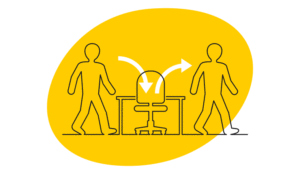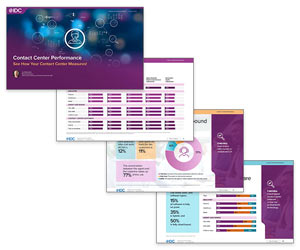Many call centres employ staff on both permanent and temporary contracts, but there may be a difference between the two in performance and attitude.
Permanent staff – the pros
The benefits of hiring permanent staff seem obvious. An agent is likely to feel more able to do their job effectively if they know they have a measure of job security, long-term prospects, and the opportunity to build relationships with other staff.
“We prefer to recruit permanent staff as we have found they offer higher levels of commitment,” said Ben Dale-Gough, Site Operations Manager at D&G Brighton.
“Often this is because they value the job stability or they’re looking to develop a career with us or within the industry.”
The theory is that permanent staff buy in to the company’s goals and values, aligning with the mission in order to progress through the ranks or develop their transferrable skills.
“Our business model allows us to plan months and even years ahead, so having the permanent staff in place suits us perfectly,” said Dale-Gough.
Customer service levels also benefit from having staff who become experts at what they do over time. A permanent agent will take time to learn about the company’s products and services and will gain invaluable experience in dealing with different types of customer.
Permanent staff – the cons
Theory doesn’t always translate into effective practice, and temporary staff can sometimes outperform permanent staff.
Manuel D’Souza, Chief Human Resources Officer at Intelenet Global Services, hires a mixture of both permanent and temporary staff.
“The results of past studies of non-standard employment have been mixed,” said D’Souza.
“The concept of partial inclusion, which suggests that full-time workers may feel more involved with their jobs than part-timers, does not offer a clear prediction regarding the effect on job satisfaction.”
Temporary workers may not feel as included in the company as permanent staff, but conversely they may also be less likely to develop negative attitudes from exposure to office politics or bad management.
Even with a fully staffed call centre of permanent employees, the nature of the business often means that some types of work are better suited to temporary employees.
D&G’s Brighton call centre occasionally takes on temporary staff to deal with specific campaigns, despite the preference for permanent staff.
“Working to a fixed-permanent contract, these employees are generally brought on board to help on a specific campaign for a set amount of time. Although it’s not our usual way of working, the flexibility of this type of contract can be beneficial for both the business and the employee,” said Ben Dale-Gough.
Some temporary employees enjoy the flexibility of temping, and their mentality is to work hard for the duration of an assignment in order to better their reputation with their parent agency.
Temporary staff – the pros
Employing someone on a temporary contract with a chance of renewal if they perform well can be a great motivating factor. Given the target-driven nature of much call centre work, the chance of a new contract can be an incentive in itself, according to Adrian Duncan, Business Development Director of P&MM Motivation.
“We ran a programme for a utilities client with a very large customer contact centre base that covered customer service interactions stats, sales referrals, and then speed of response. Only permanent employees were included in the programme, but we compared all employees, including temps,” said Duncan.
Despite the incentive programme in place for permanent staff, the temps still performed better.
“The client said it was because the temporary employees were on short-term contracts that were driving their performance.”
Temporary workers may feel a need to prove themselves in the job, and strive for an extended contract, to such an extent that they outperform permanent staff on generous motivational bonuses and incentives.
Temporary staff – the cons
The flip-side to the self-motivating nature of temporary work is that staff may take short cuts to achieve results and hit targets. As Adrian Duncan explains, the reason for the outperformance of permanent employees by temps at his client’s call centre was that some of those temps were making sales solely for their own statistics.
“It’s like the investment bank situation where bonuses are paid out based on money made that year, rather than the long-term effects it is having,” said Duncan.
Temporary agents might push through a sale quickly when the customer and the product aren’t well matched, or without referring them to a specialist agent, in order to bump up their performance statistics. This might help the individual temp get a new contract, as it looks like they are doing a good job, but it may not be best for the company in the long term.
“A more in-depth understanding was created by permanent employees than by temporary staff who went for the quick fix that looked good statistically, but longer-term did not have the desired effect,” said Duncan.
This effect is found throughout industries where temporary agents are employed. Hiring employees on a short-term or temporary basis incentivises them to perform only in keeping with this variable circumstance.
This can be overcome by attempting to change the incentive for temps. Including them in a motivational scheme, for example, may make them absorb more of the company’s aims, according to Duncan. Setting temporary contracts to a minimum of 6 months or longer may also have a similar effect.
The game-changing new legislation
The new Agency Worker Regulations in operation from October this year will have a big impact on companies that hire temporary staff. From the 1st October temps will be legally entitled to the same basic pay and conditions as permanent staff if employed for longer than 12 weeks. They will be entitled to the same commission, overtime and premium payments.
Even if employed for less than 12 weeks, temps will be entitled to the same benefits as permanent staff in terms of canteen use, childcare facilities, vacancy notifications and transport services.
This 12-week period isn’t based on time worked. It applies to part-time workers who may only work one day a week for 12 weeks – 12 days in all – as much as it would to someone who works five days a week for 12 weeks.
According to the Confederation of British Industry (CBI) the new rules will affect up to 590,000 people, 44% of the UK’s temporary workers. Many of these workers are employed in the call centre industry. The rules also introduce fines of up to £5,000 per person for companies who attempt to get rid of temps before the 12-week qualification period in order to avoid having to comply.
The new rules may reduce the difference in attitude between temps and permanent staff in call centres, as it effectively reduces the incentives for the two to perform differently.
Oranges and apples
Ultimately the differences in attitude and performance between temporary and permanent staff are manageable. The key benefit of temporary staff is the flexibility to adjust staffing levels at short notice to suit business needs, and a lower level of performance is presumably not important enough to override this need for flexibility.
On the other hand, temps are well suited to some work and can provide a boost of enthusiasm.
“One must choose a benchmark to base the comparison – at the end of the day one cannot compare apples to oranges,” said Miguel D’Souza of Intelenet.
Both serve a purpose, and comparing the two is ultimately a matter of what is chosen as the benchmark for measurement.
Do permanent employees always outperform temps? Please leave your comments below.
Author: Jo Robinson
Published On: 24th May 2011 - Last modified: 26th Oct 2022
Read more about - Customer Service Strategy, Employee Engagement, Performance Management, Staffing







































I beg to disagree that temporary employees outperform the permanent employee. For me, it is all depends on the person’s vision and acceptance on the job offered and the level of understanding in n specific job description. Attitude and Adaptability are the main core on how to stay on top of the game plus good compensation benefit that will drive employees to come to work and give their best shots in delivering the results expected at the end of the day. If temporary employees outperformed the permanent employees in the same field of work, then Management should look into that, what causes the dip of performance? What are the Root Cause Analysis (RCA) of such opportunities?
Well, I must say where I work as a temporary employee we work harder than the permanent employees, get paid less and do not get a share of the bonus scheme which we work towards every month. As we all know that if we do not hit the required targets we get asked to leave. It will be interesting to see what happens in October should I still be there.
I’m a call center director based in the US. We have a 50/50 ratio of temp to full-time agents.
I agree that results are mixed. What I find is that temps will often come in and work harder than my full-time employees. Most of the time this is because they are trying to show they are good enough to be hired on a permanent.
The problem then becomes incentivizing the permanent associates. Over time, they tend to become less productive and complacent if you don’t have good policies in place.
I’ve found that the key is consistency in management and measurement of all employees. Set the bar high and expect high things from all employees and then follow through when those expectations are not met.
The simple process of setting high expectations has allowed me to have a full team that consistently score over 90% in all areas of measurement. The temps and full-timers are all peppered throughout our metrics with no one group consistently outperforming the other.
OUR TEMPS MAKE MORE THEN OUR PERMANENTS EMPLOYEE’S….WHY????? CAN THEY DO THAT????
That is not the case here. I make less, do more, recognized less, committed more, no incentives in place to speak of, No PTO, no bonuses, no raises. Nothing. Why am I NOT permanent after 1 year and 10 months? Let’s make a decision please. This is not a permanent temp situation.